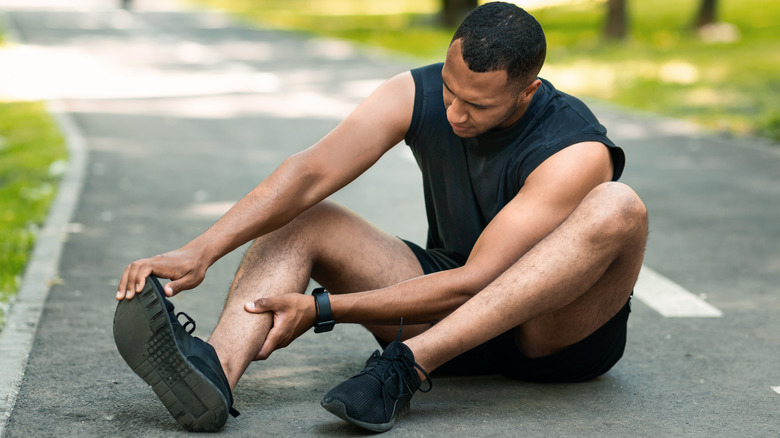How To Stop A Foot Cramp
A foot cramp can strike out of the blue and stop us in our tracks. That painful stiffening that comes over our foot is often experienced in the big toe or in the arch of our foot, according to experts at the Family Foot & Ankle Center. As we grow older, foot cramps become even more common (via Mayo Clinic).
Foot cramps occur when a muscle involuntarily contracts and is unable to relax and loosen, according to the Mayo Clinic. While it might seem to happen at random, there are reasons why some of us may be more prone to foot cramping than others. "Yes, a period of a lot of exercise, like running, can cause the muscles in the foot to cramp up, but foot cramps are more likely due to nutritional deficiencies—particularly an imbalance of water and electrolytes in your body," physical therapist Pamela Cole explains to Prevention.
Lasting anywhere from mere seconds to upwards of 15 minutes (per WebMD), foot cramps can be a result of dehydration, taking certain medications, or a lack of calcium, magnesium, potassium, or sodium in your diet, according to experts at the Mayo Clinic. The good news is that this means there are elements within our control when it comes to preventing foot cramps. With this in mind, what changes can we make to help keep foot cramps at arm's length?
How to relieve and prevent foot cramps
When you feel a foot cramp coming on, you'll want to immediately position the foot in a way that allows you to stretch the muscle. WebMD suggests pointing your foot and toes upwards towards your face while massaging the area. This can be achieved by either pulling on the foot directly with your hands or by looping a belt or towel around the ball of your foot to help pull it up further. Apply ice or, if that fails, a warm towel or heating pad to the area.
Once the cramp has passed, physical therapist Pamela Cole suggests via Prevention to either drink a 12-ounce glass of water with two pinches of salt, eat a banana, or both, in order to boost magnesium and potassium levels in the body. Ibuprofen can also help alleviate foot cramping and any residual discomfort (per WebMD).
To prevent foot cramps from coming on in the first place, experts at WebMD suggest drinking adequate amounts of water every day and regularly stretching your foot muscles. Doing so will help prime your foot muscles before exercise or help them relax prior to long periods of inactivity such as while sleeping. In addition, Prevention reports that regular consumption of foods such as fruits, veggies, fish, nuts, seeds, avocados, beans, and whole grains can also help keep foot cramps at bay.


